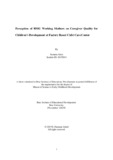| dc.contributor.advisor | Zaman, Syeda Sazia | |
| dc.contributor.author | Alam, Sumana | |
| dc.date.accessioned | 2021-10-06T04:03:00Z | |
| dc.date.available | 2021-10-06T04:03:00Z | |
| dc.date.copyright | 2019 | |
| dc.date.issued | 2019-11 | |
| dc.identifier.other | ID 18155013 | |
| dc.identifier.uri | http://hdl.handle.net/10361/15144 | |
| dc.description | This thesis is submitted in partial fulfilment of the requirements for the degree of Masters of Science in Early Child Development, 2019. | en_US |
| dc.description | Cataloged from PDF version of thesis. | |
| dc.description | Includes bibliographical references (pages 36-39). | |
| dc.description.abstract | Healthy early childhood development is important for all children, predominantly for the most disadvantaged children (Unicef, 2017). Appropriate care and stimulation in the early years had a deep influence on shaping a child’s brain to attain optimum functional capability and stability (WHO, 2004). In Bangladesh the children of RMG working mothers are in a vulnerable state due to lack of quality care in factory based childcare center (Unicef, 2015). Despite laws, labor act 2013, 94(2) of trained caregiver, set in place for factory-based childcare provisions, garment workers still suffer due to the lack of quality childcare center and also because of the lack of awareness regarding the importance of early childhood development.
The objective of this study was to expose the current condition of two factory based childcare center through identifying RMG working mother’s perception on quality of caregiving on their child’s development.
The results show that the RMG working mothers have inappropriate perceptions on quality of caregiving. Consequences show that quality of childcare center depends only on the physical environment of center. The findings also indicate that, the mothers have lack of knowledge on early childhood development and only referred about physical and language development. Regarding mother’s view on caregiver’s engagement, findings shows caregiver should be motherly, loving, and patient also can engage with children while feeding, giving bath, taking to sleep, play time. Concerning the challenges to ensure the quality caregiving in RMG factories, mothers identified some challenges such as-lack of trained and educated caregiver, insufficient caregivers are the hurdles of quality care in factory based childcare center.
Based on the findings, some suggestions have been recommended for this study through strengthening professional capacity of caregivers, creating awareness among RMG working mothers and a large scale of study for further exploration on RMG childcare center. | en_US |
| dc.description.statementofresponsibility | Sumana Alam | |
| dc.format.extent | 45 pages | |
| dc.language.iso | en | en_US |
| dc.publisher | Brac University | en_US |
| dc.rights | BRAC University thesis reports are protected by copyright. They may be viewed from this source for any purpose, but reproduction or distribution in any format is prohibited without written permission. | |
| dc.subject | RMG working mothers | en_US |
| dc.subject | Child Care Center | en_US |
| dc.subject | Quality caregiver | en_US |
| dc.subject | Early childhood development | en_US |
| dc.subject.lcsh | Working mothers | |
| dc.subject.lcsh | Clothing trade | |
| dc.title | Perception of RMG working mothers on caregiver quality for children’s development at factory based child care center | en_US |
| dc.type | Thesis | en_US |
| dc.contributor.department | Institute of Education Development, BRAC University | |
| dc.description.degree | Institute of Education Development, BRAC University | |

